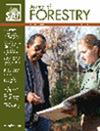The Fire Adapted Communities Pathways Tool: Facilitating Social Learning and a Science of Practice
IF 1.8
3区 农林科学
Q2 FORESTRY
引用次数: 0
Abstract
Abstract Wildfire science, policy, and practice lack systematic means for “tailoring” fire adaptation practices to socially diverse human populations and in ways that aggregate existing lessons. This article outlines the development and initial operationalization of the Fire Adapted Communities Pathways Tool, an inductive set of processes that help facilitate dialogue about needs and priorities for wildfire adaptation strategies across ownership boundaries or partners. We outline the stages and considerations organized by the tool, including how its components build from decades of social science and practitioner experience facilitating fire adaptation choices among communities spanning the United States. We then outline examples for how the pathways tool provides opportunities to reflect and respond to the needs of diverse human populations implementing fire adaptation in distinct places. Finally, we discuss how the tool can help advance a “science of practice” for wildfire adaptation by promoting social learning or gathering monitoring information at multiple scales. Study Implications: The pathways tool provides a series of empirically informed processes, choices, and engagement tactics designed to foster shared agreement about the best practices for wildfire adaptation across site-specific local conditions. We outline how the tool can advance adaptation processes for a variety of users, including (1) a community oriented planning process that will help reinforce or catalyze collective action about fire management, (2) a systematic approach for monitoring differential progress toward development of fire-adapted communities, and (3) a potential feedback mechanism that informs programmatic foci or allocation of future resources across potential actions designed for diverse social conditions.火适应社区路径工具:促进社会学习和实践科学
野火科学、政策和实践缺乏系统的方法来“定制”适应不同社会人群的火灾实践,并以综合现有经验的方式进行调整。本文概述了火灾适应社区途径工具的开发和初步运作,该工具是一套归纳过程,有助于促进跨所有权边界或合作伙伴就野火适应战略的需求和优先事项进行对话。我们概述了该工具组织的阶段和考虑因素,包括其组成部分如何从数十年的社会科学和从业者经验中构建,促进美国社区的火灾适应选择。然后,我们概述了路径工具如何提供机会来反映和响应在不同地方实施火灾适应的不同人群的需求的示例。最后,我们讨论了该工具如何通过促进社会学习或收集多个尺度的监测信息来帮助推进野火适应的“实践科学”。研究意义:路径工具提供了一系列经验丰富的过程、选择和参与策略,旨在促进对特定地点当地条件下野火适应最佳实践的共识。我们概述了该工具如何促进各种用户的适应过程,包括:(1)以社区为导向的规划过程,有助于加强或催化有关火灾管理的集体行动;(2)监测适应火灾社区发展的不同进展的系统方法;(3)潜在的反馈机制,为针对不同社会条件设计的潜在行动提供规划重点或未来资源分配信息。
本文章由计算机程序翻译,如有差异,请以英文原文为准。
求助全文
约1分钟内获得全文
求助全文
来源期刊

Journal of Forestry
农林科学-林学
CiteScore
4.90
自引率
8.70%
发文量
45
审稿时长
>24 weeks
期刊介绍:
The Journal of Forestry is the most widely circulated scholarly forestry journal in the world. In print since 1902, the mission of the Journal of Forestry is to advance the profession of forestry by keeping forest management professionals informed about significant developments and ideas in the many facets of forestry. The Journal is published bimonthly: January, March, May, July, September, and November.
 求助内容:
求助内容: 应助结果提醒方式:
应助结果提醒方式:


